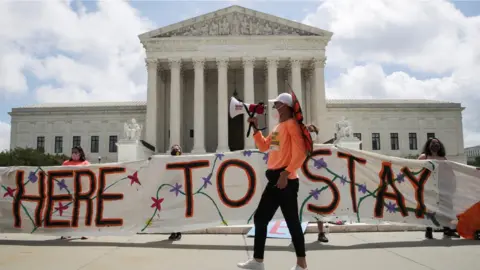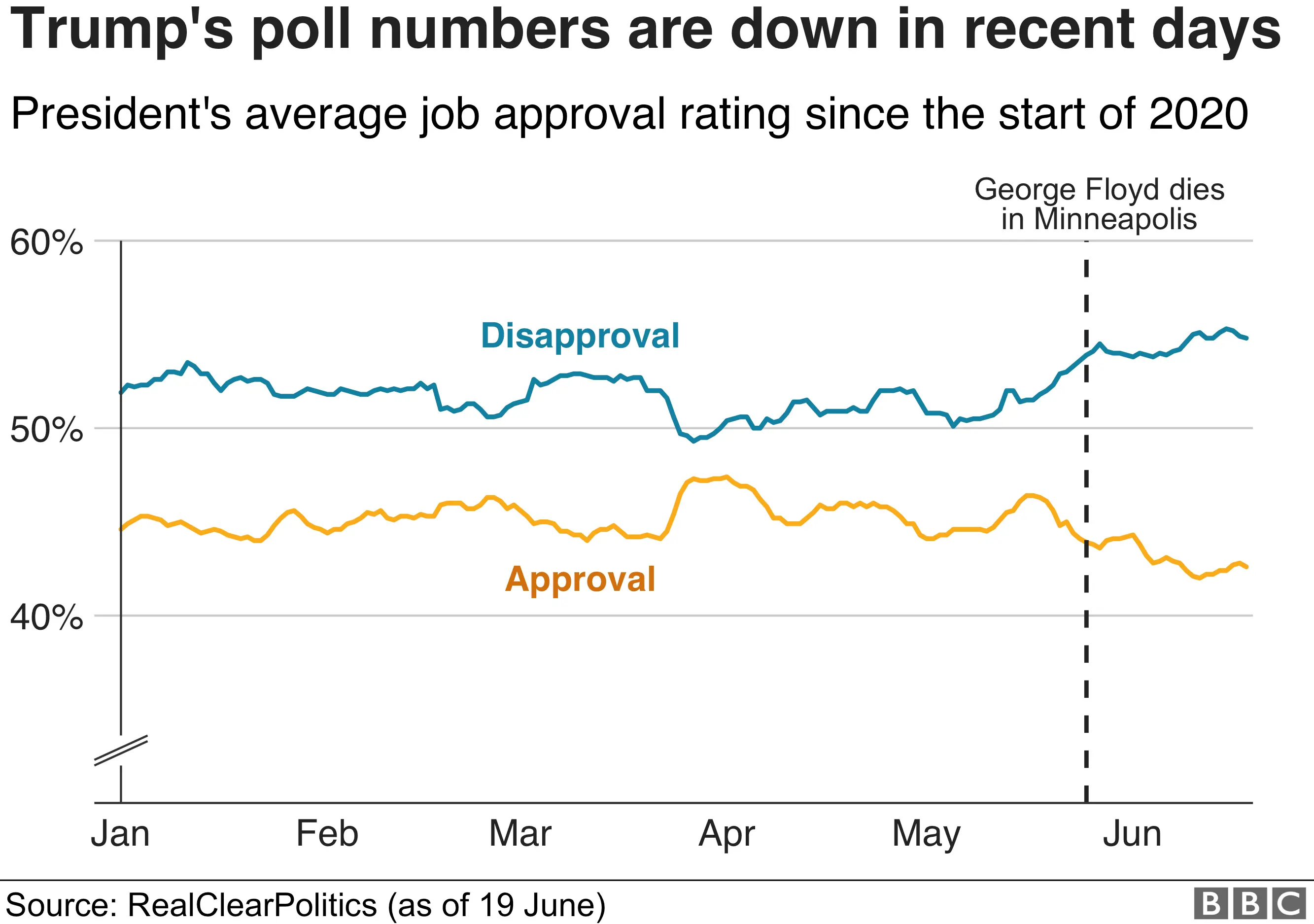Four reasons why this was a bad week for Trump

 Getty Images
Getty ImagesIt's been a trying week for Donald Trump on a number of fronts, as his political challenges appear to be multiplying.
While the mass demonstrations and violent clashes of the past month appear to be in the rear-view mirror, new headaches are emerging while old ones come back with a vengeance.
Even in a presidency that seems to bounce from crisis to crisis, some unexpected and others self-made, this week has been a particularly rough ride.
Covid-19 cases spiking
In an interview on Wednesday evening, Donald Trump said that the coronavirus was "fading away", echoing comments he made earlier this year - before US deaths rose past 100,000 - that the pandemic would eventually disappear "like a miracle".
The evidence indicates, however, that the virus is not only still a public health threat in the US, its rate of spread is increasing once again.
Ten states set record-high numbers of Covid-19 cases this week, while 23 are seeing some level of growth. Many of the states, including Texas, Florida and Arizona, were ones that had led the way on easing shelter-in-place and business-closure restrictions, prompting public-health officials to express concern that these moves were premature.
That these states are also battlegrounds in the coming national election just makes matters worse for the president.
In an opinion piece published in the Wall Street Journal on Tuesday, Vice-President Mike Pence - head of the White House's coronavirus task force - dismissed the worries as "overblown" panic fed by media fear mongering.
However, some state and local officials are already calling for re-imposing mitigation measures before the US healthcare system is overwhelmed.
The uncertainty is starting again to take a toll on the US economy, with stocks whiplashing this week between big increases and sharp dips and new weekly unemployment claims continuing to top one million.
It's hardly the news Trump wants to hear as he pushes for more re-openings, and prepares to resume his political rallies in packed sports arenas with little social distancing.
Supreme Court setbacks
One of Trump's key campaign promises in 2016 was that he would appoint conservatives to the federal courts. In the ensuing three-and-a-half years, he's followed through, seating nearly 200 new judges, including two justices to the nine-person US Supreme Court.
It was therefore more than a bit discouraging for a president who frequently touts his newly reformed conservative judiciary to watch as the Supreme Court this week ruled against the administration in two high-profile cases.
 Reuters
ReutersFirst, the court discarded the Trump administration's contention that a 1964 civil rights law did not provide workplace discrimination protections to gay and transgender employees.
Then, it invalidated the White House's attempt to rescind an Obama-era programme giving temporary normalised immigration status to undocumented migrants who entered the US as children.
The president, needless to say, did not take the court decisions well. In a series of tweets on Thursday, he called them "a shotgun blast to the face" of Republicans and conservatives. He even viewed the setbacks in personal terms, musing that the Supreme Court "doesn't like" him.
The impact Trump has had on the federal judiciary is very real and will be felt for a generation to come, but the president would prefer that his conservative supporters have tangible proof of those changes as he asks for their enthusiastic support in the run-up to election day.
Tell-all books
 Getty Images
Getty ImagesFor months former National Security Adviser John Bolton's memoir has been a storm whose distant rumbling suggested trouble to come. This week the book's juiciest bits were revealed with the force of a thunderclap.
The president is seemingly uninterested in the details of governing and uninformed on basic issues of foreign policy, Bolton writes, providing numerous anecdotes and episodes.
Trump pressured Chinese President Xi Jinping to buy US agriculture products to help his re-election campaign, Bolton says, while offering approval for China's plan to build forced-labour camps for its Muslim Uighur minority.
He also confirmed the Democratic impeachment charge that the president wanted to withhold military aid to Ukraine as a way of pressuring that nation to provide damaging information about Democratic presidential rival Joe Biden.
None of this is exactly new, of course. There have been plenty of anonymous media reports making similar allegations against this president and his administration.
However, Bolton is the most senior ex-official to do so on the record, and the timing - less than five months before the general election - is not great for the president.
The book situation for Trump may go from bad to worse as this week also brought news that the president's niece, Mary L Trump, is writing an insider expose about the president and his family life that will hit shelves in August.
According to a publisher's preview, the book will describe the "nightmare of traumas, destructive relationships, and a tragic combination of neglect and abuse" that she witnessed as a member of the Trump family.
The New York Times has panned Bolton's book as bloated, "exceedingly tedious and slightly unhinged", suggesting it may be unreadable for the average American. The public loves juicy family gossip, however, so Trump's niece may have a blockbuster on her hands - while the president has a personal and political embarrassment on his.
Sinking poll numbers
Last week the Trump campaign wrote a "cease and desist" letter to CNN, demanding that it apologise and retract a poll that showed the president trailing presumptive Democratic opponent Joe Biden by 14 points, 55% to 41%.
Trump's team called the survey biased and poorly conducted, among other allegations.
Since then, several polls from other sources have come out that show Biden with similarly sizable leads. If the president wants to fight them all, his lawyers are going to be busy.
The president should find these polling trend lines concerning. According to a RealClearPolitics average, his deficit to Biden has grown from 5.3% at the end of May to 8.5% this week. Meanwhile, his net unfavourability rating has sunk from 5.1% in mid-May, to 12.2% now.
And 67% of Americans currently say the nation is heading on the "wrong track" - the highest mark of Trump's White House term.

These are not encouraging numbers for a president seeking re-election in less than five months.
The coronavirus pandemic, followed by the mass demonstrations after George Floyd's death - and the administration's response to them - appears to be taking a toll on Trump's political fortunes.
There is also evidence this weakness is bleeding into congressional races, causing Republicans to become increasingly concerned that their three-seat Senate majority could be at risk and their hopes of taking back the House of Representatives from the Democrats are dwindling.
Trump still has plenty of time to regroup, of course, and his margins are much narrower in key electoral battleground states. But at least for the moment, however, he and his party are heading in the wrong direction.
